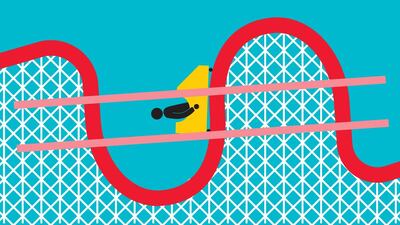Popular budgeting advice is meaningless for people whose salaries go up and down every month.
Freelancers, the self-employed, and those who depend on tips or commissions can have a great-paying month or a bad one, and that leaves them vulnerable. A Federal Reserve report released in May found that nearly a third of US adults had irregular incomes in 2016 — and 40 per cent of those struggled to pay bills as a result.
Financial experts' best advice is to plan ahead as much as possible, using creativity and new tech tools designed for those with irregular incomes. Here are five tips for managing money when your salary fluctuates:
1. Build an emergency fund
People with sporadic income should save nine months' worth of expenses in an emergency fund , says Todd Youngdahl, managing partner at Washington Wealth Advisors in Virginia, US.
That's more than the standard recommendation of three to six months' worth. The extra allows you to "dip in to cover expenses in a month that you don't get paid as much," Mr Youngdahl says.
It might take time to reach that goal, but research shows that even a small cushion improves financial health. According to a 2016 Urban Institute study, families with fairly low savings levels ($250 to $749) were still less likely to face eviction, miss bill payments or resort to public benefits than those without savings.
"Even a little bit can help someone smooth over their income in a month that they earn less," says Shana Beal, director of communications at Earn, a nonprofit organisation.
____________
Read more:
Broke after the holidays? Here are 20 tips to get your finances back on track in the UAE
Six wallet-friendly platforms designed to save you money
Make your budgeting plan, then stick to it
_____________
2. Budget what you spend
"When you have irregular income, you must live below your means," says Mark Kemp, a certified financial planner in Harleysville, Pennsylvania.
Because you don't know your income for a given month, construct your budget around your baseline spending.
Add up the costs of your necessities, including housing, utilities, food, insurance and transportation, and include a monthly amount for annual bills, such as property taxes. Don't include extras like restaurant meals or taxi rides, just the minimum amount you need each month.
Then find out if last year's earnings covered this baseline. If not, you might need to trim expenses. And use surpluses from peak months to build your reserve for lean months, says Barbara O'Neill, a certified financial planner in Newton, New Jersey.
3. Create a steady monthly wage
Take control of your cash flow by setting up separate accounts for deposits and spending.
Deposit pay cheques into one account. Each month, use it to pay yourself a "salary" that covers expenses. "This creates a steady monthly income that goes into the checking account your expenses are paid from," says Clayton Shearer, a certified financial planner at A&I Financial Services in the Denver area.
If you tend to receive many small checks each month, and your reserve fund isn't fully funded yet, try weekly transfers.
4. Live by the 50-30-20 rule
Once you set yourself a monthly income, you need to monitor how you spend that amount you each month. The best advice is to apply the 50-30-20 rule; this allots a set percentage of income to necessities, wants and needs. To explain further:
• 50 per cent for your needs: This is where you limit all monthly expenses such as rent, groceries, petrol etc to this
this percentage of what you have to spend.
• 30 per cent for your wants: Limit your expenditure on non-essentials, such as going out and entertainment to just under a third of your allowance for that month.
• 20 per cent to savings: This is how much you have to spend on saving or investing your money and paying down any debts. This includes your emergency fund savings and any investments.
By adopting this method, you will be able to manage your finances in a much more controlled way, while building an emergency buffer at the same time.
5. Track your spending
To further compound your new financial habits, keep track of all your expenses, however minor, so that you have a clear idea of what your money is spent on.
The best way to do this is to use an app. While popular international options that track spending and help you estimate future expenditure include Mint or Personal Capital, closer to home we have the UAE-founded Wally. Available on iTunes and first launched in 2013, it tracks your spending by relying on you, the user, to log your expenses as you go. From what you spend on school fees and groceries to eating out and more, all of it must be recorded into the app to give you an accurate picture of your spending habits - good and bad.
This is key for the freelance or self-employed worker as they need to have a clear idea of how they spend their money to ensure they can conserve cash in those leaner months when they earn less.

